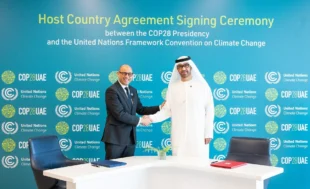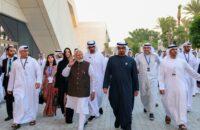From Jerk-Transtion to Just-Transition
COP28 sets tone to begin new era from 2024.

Nearly 70,000 participants in COP28 in Dubai from 196 countries returned home wondering what to make of the outcome of COP28.
As an Indian I too started reflecting on the final unanimously agreed decisions at this UN Climate Conference. Two questions predominantly came into my mind: what COP28 outcome means to India and what is the message for Indian citizens-business, farmers, laborer, researchers , students and general public.
Being a Director in UN in its Environment Programme for more than two decade, and earlier as Technical advisor to Government of India for Multilateral Environmental Agreements ( MEAs) , I had advantage of understanding the nuances in the debates , negotiations and the final deal reached with global consensus. Indeed, many criticized the UN’s gatherings as waste of time and money. Many intellectuals also sarcastically sighted that such global climate conferences that aim to reduce the emissions themselves emit huge amount of carbon dioxide, But I am of the firm opinion, that COP has no other options and is the only ‘game in the town’, the only choice, which one must accept for want of a better one. UN has global convening power that brings all the countries under one roof to deliberate the global issues that affect the local people in each of these countries and promote remedial actions.
That’s what exactly India did in COP28. PM Modi in his speech in the beginning of the meeting set the tone that many wanted to hear when ball started rolling for 12 days conference. Modi had obvious advantage as he had successfully got the consensus document few months back under G20 for which India held the presidency for 2023. G20 comprises of countries that represent 80% world’s GDP, 75% of global trade, 70 percent of the global population and 60% of the planet’s land. UAE , the host of COP28 was the special invitee in G20 in 2023.
G20 final declaration highlighted the minimal role of global south (developing countries ) in the current climate crisis but they are the most affected by the adverse impacts of climate change. ‘Few rich countries in the world have destroyed the nature in indiscriminate manner and today poor countries have to face the consequences’, stated Modi. But still, global south is committed to take action to achieve the goals of Paris Climate Agreement. Apart from Climate Action, two global issues that COP28 considered in its final document: Climate Justice and Climate Finance.
Many decried that words ‘phase-out of fossil fuel’ were not included in the final decisions. Instead , what was included were ‘ transition away from the fossil fuel in just, inclusive and equitable way’. I thought that choice of the word ‘just’ is the major win and success of COP28.
‘Just’ as the adjective used for energy-transition is overlooked and missed by many. It has originated from another word, ‘justice’, more specifically ‘social justice’. Just transition includes a set of principles and practices that aim to ensure that no people, farmers, workers, students, states, countries or regions are left behind in the energy transition from a high-carbon to low carbon economy. ‘Just-transition will ensure secure, bright and sustainable future which is not possible with ‘ jurk-transition’ by taking plug out of fossil fuel and leaving poor in global south in misery.
Indeed, much awaited global stocktake document clearly laid out dire, dreadful and dismal progress made by the countries on Climate Action.
First, global-stock take concluded that the world (developed and developing countries together) is far away from reduction target for the carbon emission . Carbon emissions need to be halved, as per IPCC, by 2025-2030 and should be near net zero by 2050-2075. However, presently they are still rising and if the present trend continues , they are expected to be only about 5 percent lower in 2030 as compared to 2019, instead the goal of 43 percent reduction.
Second the promise by developed countries to mobilize finances of USD 100 billion per year by 2020 for developing countries, in the context of meaningful mitigation actions was not met. Even in 2022 and in 2023, financial support by developed countries not expected to reach the annual target. Total pending contribution till now is more than a trillion dollar. Trillions more are needed to meet 2030 and 2050 targets.
India itself is on path to achieve NDCs (Nationally Determined Contributions) committed to UNFCCC to address the climate crisis. But it would have to do more to achieve its targets of reaching to 45% reduction in energy intensity, 50% of total energy from non-fossil fuel by 2030 and enhancing the green (forest) cover. India has also now taken up ambitious target of tripling the renewable energy and doubling the energy efficiency by 2030.
There is strong message to business and Industry in India to step up the efforts for enhancing energy efficiency efforts, the capacity of solar and wind energy along with hydroelectricity and nuclear. Hydrogen technology can fill the 15% gap. Reduction in Methane leakages and flaring can help in early achievement of net zero.
Here is the opportunity for India to benefit from its demographic advantage of one of the largest pools of youth in the world. Youth in India is not only the largest in number but also the most innovative and creative. The world has realised the extraordinary power of youth and India’s Universities and higher education institutes.
Indian origin CEOs control about USD 1 trillion international business today, part from 3 trillion domestic economy of India. New and clean energy revolution would be tipping point if India’s youth in the universities supported by Policy makers are encouraged. The way India was the most talked about country in vaccines for COVID19, the moment has now come for India to be world leader in the energy transition away from fossil fuel and change the world to net zero. The way internet and digital technologies have transformed our societies for ever, ‘just, inclusive and equitable transition away from the fossil fuel’ can also become transformative and put India and Indian Universities top in the world map.
END



Leave a Reply